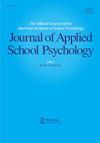Parental Self-Efficacy: Impact of a School Readiness Summer Parenting Intervention
IF 1.5
Q4 PSYCHOLOGY, EDUCATIONAL
引用次数: 0
Abstract
AbstractThis study examined the impact of a virtual parenting intervention designed to support parents of incoming kindergartners (N = 45) by bolstering their parental self-efficacy during the summer of 2020, immediately following the onset of the COVID-19 pandemic. Specifically, this group-based intervention provided parents with weekly psychoeducation of parenting skills to support their child’s development and wellbeing, a toolkit of kindergarten readiness resources, and social support with other parents. Parent self-efficacy was collected pre and post intervention utilizing the Parent Empowerment and Efficacy Measure (PEEM). Paired samples t-tests demonstrated statistically significant increases in parents’ overall self-efficacy, t(44) = 3.55, p < .05, and efficacy to connect to resources following the intervention, t(44) = 4.30, p < .05. Focus groups explored parents’ perceived growth and confidence to parent and the quality of the relationship with their child after the intervention. Thematic analyses illuminated five core themes, including increased confidence in managing their child’s behavior and emotional regulation, increased ability to perspective take with their child, increased knowledge of milestones and child development, improved conscientiousness and intentional parenting skills, and an increased efficacy to utilize a toolkit of parent resources and skills. Results and implications are discussed regarding how school psychologists and other school staff can support the home learning environment of families during the transition to kindergarten to promote optimal child development.Keywords: Parent trainingearly childhoodinterventionskindergartenprevention AcknowledgementsThe authors would like to thank all the parents who participated in this research study and intervention during the midst of the COVID-19 pandemic. Additionally, the authors would like to acknowledge the efforts of the undergraduate research assistants who contributed to data transcription.Disclosure statementNo potential conflict of interest was reported by the authors.Ethics approvalThis study was reviewed and determined exempt by the University of California, Santa Barbara Internal Review Board.父母自我效能:暑期父母干预对学校准备的影响
摘要本研究考察了虚拟育儿干预的影响,该干预旨在支持2020年夏季即将到来的幼儿园儿童(N = 45)的父母,在2019冠状病毒病大流行爆发后立即提高他们的父母自我效能感。具体来说,这种以小组为基础的干预为父母提供了每周的育儿技能心理教育,以支持他们孩子的发展和幸福,幼儿园准备资源工具包,以及与其他父母的社会支持。采用父母授权与效能量表(PEEM)收集干预前后父母的自我效能感。配对样本t检验结果显示,干预后父母整体自我效能提高,t(44) = 3.55, p < 0.05;干预后父母资源连接效能提高,t(44) = 4.30, p < 0.05。焦点小组探讨了干预后父母的成长和对父母的信心以及与孩子关系的质量。专题分析阐明了五个核心主题,包括增加管理孩子行为和情绪调节的信心,增加与孩子一起看待问题的能力,增加对里程碑和儿童发展的知识,提高责任心和有意育儿技能,以及提高利用父母资源和技能工具包的效率。本文讨论了学校心理学家和其他学校工作人员如何在过渡到幼儿园期间支持家庭的家庭学习环境,以促进儿童的最佳发展。关键词:家长培训幼儿干预幼儿园预防感谢作者感谢所有在COVID-19大流行期间参与本研究和干预的家长。此外,作者要感谢为数据转录做出贡献的本科生研究助理的努力。披露声明作者未报告潜在的利益冲突。伦理批准本研究由加州大学圣巴巴拉分校内部审查委员会审查并确定为豁免。
本文章由计算机程序翻译,如有差异,请以英文原文为准。
求助全文
约1分钟内获得全文
求助全文
来源期刊

Journal of Applied School Psychology
PSYCHOLOGY, EDUCATIONAL-
CiteScore
2.40
自引率
10.00%
发文量
7
期刊介绍:
With a new publisher (Taylor & Francis) and a new editor (David L. Wodrich), the Journal of Applied School Psychology will continue to publish articles and periodic thematic issues in 2009. Each submission should rest on either solid theoretical or empirical support and provide information that can be used in applied school settings, related educational systems, or community locations in which practitioners work. Manuscripts appropriate for publication in the journal will reflect psychological applications that pertain to individual students, groups of students, teachers, parents, and administrators. The journal also seeks, over time, novel and creative ways in which to disseminate information about practically sound and empirically supported school psychology practice.
 求助内容:
求助内容: 应助结果提醒方式:
应助结果提醒方式:


